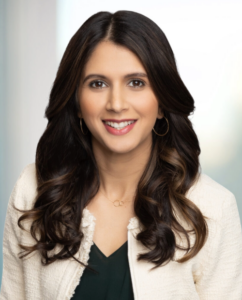Meet Our Team: Q&A with Vice President, Sharen Ludher
 How did you become interested in working in healthcare, more specifically Medicaid? Why did you choose this path?
How did you become interested in working in healthcare, more specifically Medicaid? Why did you choose this path?
My first introduction to healthcare was through the workers compensation agency for state employees in Texas. This was my first job out of college, working as a licensed claims adjuster, and it gave me an opportunity to learn about the complexity of the healthcare system and the challenges it faces. I was responsible for managing a caseload and saw how critical the benefits we administered were for employees trying to recover from injuries and return to their jobs. I saw the system work well for some individuals, and not so well for others. That experience sparked an interest in healthcare policy, leading me to graduate school and then secure a policy analyst position with the Texas Senate, working on Medicaid policy with a focus on managed care programs. This role exposed me to key stakeholders – Medicaid beneficiaries and their families, providers, payers, the state Medicaid director, and program staff – and I was inspired by how passionate and committed all of these folks were to improving the Medicaid program. I knew I wanted to be a part of these efforts and have been fortunate to spend the last 15+ years working in and around Medicaid in various roles.
What brought you to Sellers Dorsey?
It was 2017 and I was working as a Senior Advisor to Gary Jessee during his tenure as Texas Medicaid Director and subsequently Deputy Executive Commissioner. Gary let me know he was leaving state government to establish a new consulting team at Sellers Dorsey and asked me to join him (read: told me I would be joining him). I was already familiar with the Firm’s strong reputation nationally, and it was an exciting opportunity to build something new from the ground up. After visiting our Philadelphia office and spending time with some of our future colleagues, I knew it was the right decision.
What is your special area of expertise?
That’s an interesting question, because it has actually shifted in recent years. For over a decade, I was focused on Medicaid managed care policy and programs, first while working at the state legislature, and then for the state health plan association, the Medicaid program, and in my first few years at Sellers Dorsey. I thought I would continue to focus that way here as a consultant, but in the last few years I’ve transitioned to leading business operations for our growing National Consulting Practice. While my focus is more internal now, the knowledge and experience I gained from working directly with clients has given me helpful insights to support our client servicing teams, sales and contracting processes, and business growth.
What is your superpower and what is your kryptonite?
I would say my attention to detail is both my superpower and my kryptonite. It helps me catch the little things, but it also means that I can’t not think about the little things once I notice them!
What types of clients do you typically serve?
I lead a small but mighty operations team within the National Consulting Practice that serves both internal and external clients. Internally, our focus is on supporting our client servicing teams operationally to ensure our clients get the highest quality consulting services. We also work closely with prospective client organizations to understand their consulting needs, collaborate across our team and the firm to identify the best resources to support the engagement, and facilitate the proposal and contracting processes so we can deploy our teams quickly to provide support.
What is a project that you’ve worked on while at Sellers Dorsey that you’re especially proud of?
I am especially proud of the work I’ve done with Gary to establish the National Consulting Practice. We are approaching our seven-year anniversary on August 1. I think it’s easy sometimes to get so caught up in the day-to-day milestones and goals of our work that we forget the big picture of just how far the team has come. We started out as just the two of us, working in a co-working space, and now, we’ve grown to a team of more than 40 incredibly talented colleagues supporting a strong and diverse network of clients, tackling challenges, and creating meaningful solutions.
What do you enjoy most about your role at Sellers Dorsey? What is most rewarding?
This is a place where individuals have an opportunity to grow. I came here with a certain set of experiences and a certain skill set, but I was able to take on new opportunities and challenges. It let me grow new and different skills that I never would have imagined. That culture of growth is there across the Firm – growth as a company, growth as professionals, and the culture of individual growth.
What is one fun fact that people would be surprised to learn about you?
In Punjabi, my parents’ native language, “Sharen” means refuge, shelter, or protection. Although I’ve lived in Texas my whole life, my parents were both born and raised thousands of miles away in rural Punjab, India, on farms which their families still operate today. They grew up with no running water or indoor plumbing, and at times no electricity. My mom was 17 years old when she left her family’s home and immigrated to the U.S., and my dad a few years later when he was 23 years old. The tremendous sacrifices they made coming to a country they didn’t know, and the opportunities I’ve been afforded as a result, have helped shape who I am today.
What was your very first job?
My first job was as a cashier at a grocery store, but I was promoted quickly to a supervisor while still in high school, which now looking back, seems a bit questionable!
What is your favorite thing to do outside of work?
I am really bad at favorites because I am unable to choose just one, so I will say quality time with loved ones and then anything physical fitness or active and outdoors. Prioritizing those things outside of work is how I bring my best self to both my personal life and my work life. And if I can combine the two, doing something outdoors with my loved ones? Even better.
Name your all-time favorite movie or book.
Did I mention I’m bad at favorites? I don’t know if it’s my all-time favorite, but the book Quiet, The Power of Introverts in a World that Can’t Stop Talking, by Susan Cain, had a huge impact on me. It changed my perception of being an introvert, helping me to see the positive attributes and strengths that introverts bring to the table.
Want to learn more about Sharen’s role at Sellers Dorsey?
Click here to explore how she helps the Firm enhance impact for clients.

